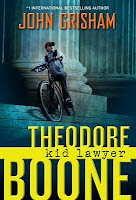 A slightly different version of the following review was first posted in a "Writing Children's Literature" online course I recently took from Western New Mexico University.
A slightly different version of the following review was first posted in a "Writing Children's Literature" online course I recently took from Western New Mexico University.
As far as I know, “Theodore Boone, Kid Lawyer” is John Grisham’s first attempt at a book for younger readers. Obviously, he is well known for his mainstream legal thrillers, several of which have been made into movies. This book follows eighth grader Theodore Boone, an only child parented by attorneys, who is already handing out legal advice to his classmates and even to adults. (As almost all of Theo's advice consists of telling his "clients" to go talk to real lawyers, I presume this is not illegal but I did wonder.)
In some ways, I worry that I am not capable of being entirely fair to this book, because so much of it rubbed me the wrong way that I am probably overlooking some good qualities that would actually appeal to kids. My biggest issue was with Theo's inconsistent voice. He's an eighth-grader who hacks into his parents' legal databases, who follows trials the way other kids follow baseball, and who explains legal terms such as "double jeopardy" and "mistrial" to his classmates. However, he also tells the reader that "the smart people in charge of educating all the children in the town" decided to gender-segregate their classes, and he blurts out that he doesn't understand what the judge means when he says that he could hold Theo in contempt for not revealing information important to an ongoing trial. Hmmm. First, I would have thought that Theo would know the term "school board". Second, Theo knows every legal term out there except contempt of court?
(And hey! Assuming my memory is correct -- I've already gotten rid of the book so I can't easily check -- and Theo goes to a public school, wouldn't his lawyer parents have screamed bloody murder about gender segregation? I sure would, especially considering that Theo gets permission for his class to go watch the opening day of a trial, which means all boys and no girls get to go on this little field trip. That really ticked me off. And is it realistic that most of Theo's eighth-grade classmates are not allowed to have cell phones at all?)
[Some spoilers below.]
In any case, the book opens with Theo attending the first day of what passes for a high-profile murder trial in his small-ish town. The defendant has been accused of murdering his wife, and everyone believes he is guilty but the prosecution has a weak case. In the meantime, Theo becomes involved when a boy from the local shelter where Theo volunteers tells him that his cousin, an illegal immigrant, witnessed something that would prove the defendant’s guilt. Theo wrestles with the problem, and ultimately all that happens is that he talks to his uncle (a former lawyer), and then his parents, and then a judge. Unlike in The Firm or even The Client, Theo doesn't use his ingenuity to think up a solution to the problem. That may be realistic considering his age, but it's just boring. At the very least, I would have expected a Grisham-like scene in which a bad guy chases Theo to tell him to stop snooping, but the most we get is a scary-looking guy who glares at Theo from across the courtroom once or twice. A mistrial is declared and that’s the end of the book. It’s very anticlimactic. If any of the characters were particularly interesting it would mitigate this somewhat, but the whole book feels antiseptic.
I have to admit, I tend to think this is yet another case of an author, agent, and/or publisher thinking it would be a good idea to dip into the lucrative YA market without actually considering whether the material would hold any particular appeal. I also think that better editing would have resulted in a better book, at least in terms of keeping Theo’s voice on track.
Tuesday, August 10, 2010
Theodore Boone, Kid Lawyer
Labels:
young adult
Subscribe to:
Post Comments (Atom)





3 comments:
I know what you mean about the inconsistent voice. This problem often entirely spoils a book for me, and I find it occurring most often with young characters; I guess adult authors have trouble figuring out when a child should speak like a child? How frustrating. Sophie's World by Jostein Gaarder upset me to no end in the same way: I think Sophie is 14 years old, and mostly sounds like a textbook. There should be some nod to believability in a book.
i loved the book. i dont agree to the bad things you said. hes 13 years old, he doesent have to know every legall terrm. As for the hacking, i sure there r some kids in real life who know how to hack.
The book never said he went to pubilc school so his school can be gender seperate, its all up to the auther, and what he wants to do.
jjkane, sorry to take so long to approve your comment; I just saw it today.
I'm glad you enjoyed the book, and that you found Theo's voice realistic. That's fair enough! However, even if the book never said that Theo went to public school, Theo referred to the "smart people who decide how to educate all the kids in town." That by definition equals public school -- and they can't just gender segregate public school. You're right that the author can do what he or she wants, but it's also the case that if they include something that is contrary to what the reader knows to be true in real life, it might bug the reader a little bit. No big deal; we don't all have to like every book.
Post a Comment